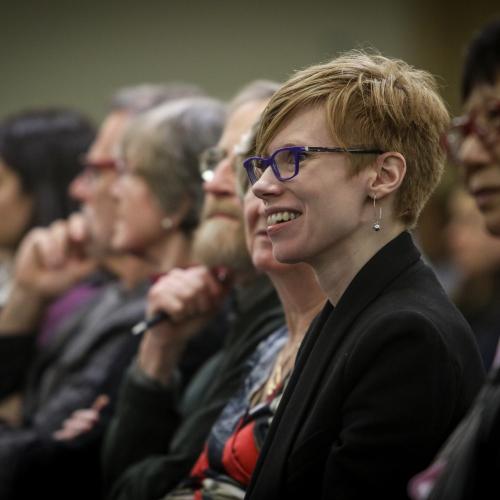Children pick up a lot more than just words as they learn how to speak - they tune into accents, tone and social cues from an early age. How do the languages they hear at home or in their communities shape their learning?

Children pick up a lot more than just words as they learn how to speak - they tune into accents, tone and social cues from an early age. How do the languages they hear at home or in their communities shape their learning?
Join us for a fascinating talk by Professor Elizabeth Johnson on how children learn to communicate in linguistically diverse environments. Drawing on insights from developmental psychology, linguistics, and speech sciences, explore how kids not only process sounds and words but also develop an awareness of the social aspects of speech, from accents to tone and gender.
Be part of the conversation at this follow-up event to the story featured in University of Toronto Magazine’s January digital issue.
Register now to tune into the livestream and receive the post-event recording.
Speaker
Elizabeth Johnson
Dr. Johnson is an Associate Professor of Psychology at the University of Toronto, and the Director of the UTM Child Language and Speech Studies Lab (C.L.A.S.S. Lab). In 2012, Johnson was awarded a Canada Research Chair in Spoken Language Acquisition. Her main line of research is focused on understanding how children acquire their native language(s). A sampling of topics recently under study in her lab include the development of spoken word recognition, how infants learn to cope with connected speech processes and segment words from speech, audio-visual speech perception, infant multilingualism, accent and dialect perception, the development of word-learning heuristics, experiential effects on voice recognition, the link between early perception and production, and the acquisition of language-specific prosody.
Dr. Johnson received her BA from the University of Rochester, where she majored in Brain & Cognitive Sciences and completed a Take Five program in Developmental Biology & Evolution. She earned her MA in Psychology and her PhD in Psychological & Brain Sciences at The Johns Hopkins University.
About University of Toronto Magazine
For 50 years, University of Toronto Magazine has been sharing inspiring stories about the people, ideas and events that make the university a global leader in teaching, research and innovation.
Available online and in print, the magazine is published twice a year and all U of T graduates receive a complimentary subscription. In each issue, you’ll find stories that dig into U of T’s rich history and the latest advances in research, shine a light on the diverse communities of our St. George, Mississauga and Scarborough campuses and celebrate the indelible contributions that U of T alumni are making in Canada and around the world.
If you’re enjoying your subscription, please consider a donation to help advance U of T’s mission to educate, inform and discover. Every cent of your contribution, will be receipted for income-tax purposes, and go entirely towards the magazine.
Have questions about this event?
Contact DUA Events at dua.events@utoronto.ca
This event is part of
Online events
U of T alumni online programming includes free Massive Online Open Courses (MOOCs), the U of T alumni book club, and online lectures and webinars on a wide range of topics from health to computing to Indigenous Studies.
This event is part of
Global Events
Bring the University of Toronto wherever you are, find global events and connect with alumni around the world.
This event is part of
U of T Where You Are
U of T’s popular lecture series comes to where you live and work, in cities around the world. Stay informed, get inspired!








